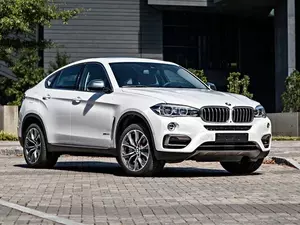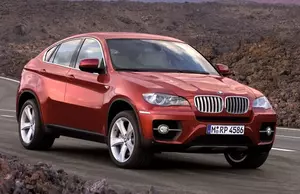
| Vehicle | Precise engine size | Difference from world average | Engine size to consumption ratio | Horsepower from 1 L | Engine size to 100 kg of weight |
|---|---|---|---|---|---|
| M50i |
4.4 L (4395 cc) |
87.3% bigger | 191 cc to 1 mpg | 120 hp from 1 L | 200 cc to 100 kg |
| M50d |
2.99 L (2993 cc) |
27.6% bigger | 88 cc to 1 mpg | 134 hp from 1 L | 130 cc to 100 kg |
| 30d |
2.99 L (2993 cc) |
27.6% bigger | 77 cc to 1 mpg | 89 hp from 1 L | 143 cc to 100 kg |
| 40i |
3 L (2998 cc) |
27.8% bigger | 103 cc to 1 mpg | 113 hp from 1 L | 136 cc to 100 kg |
| 40d |
2.99 L (2993 cc) |
27.6% bigger | - | 114 hp from 1 L | 136 cc to 100 kg |
| Vehicle | M50i |
|---|---|
| Precise engine size | 4.4 L (4395 cc) |
| Difference from world average | 87.3 bigger |
| Engine size to consumption ratio | 191 cc to 1 mpg |
| Horsepower from 1 L | 120 hp from 1 L |
| Engine size to 100 kg of weight | 200 cc to 100 kg |
| Vehicle | M50d |
| Precise engine size | 2.99 L (2993 cc) |
| Difference from world average | 27.6 bigger |
| Engine size to consumption ratio | 88 cc to 1 mpg |
| Horsepower from 1 L | 134 hp from 1 L |
| Engine size to 100 kg of weight | 130 cc to 100 kg |
| Vehicle | 30d |
| Precise engine size | 2.99 L (2993 cc) |
| Difference from world average | 27.6 bigger |
| Engine size to consumption ratio | 77 cc to 1 mpg |
| Horsepower from 1 L | 89 hp from 1 L |
| Engine size to 100 kg of weight | 143 cc to 100 kg |
| Vehicle | 40i |
| Precise engine size | 3 L (2998 cc) |
| Difference from world average | 27.8 bigger |
| Engine size to consumption ratio | 103 cc to 1 mpg |
| Horsepower from 1 L | 113 hp from 1 L |
| Engine size to 100 kg of weight | 136 cc to 100 kg |
| Vehicle | 40d |
| Precise engine size | 2.99 L (2993 cc) |
| Difference from world average | 27.6 bigger |
| Engine size to consumption ratio | - |
| Horsepower from 1 L | 114 hp from 1 L |
| Engine size to 100 kg of weight | 136 cc to 100 kg |

| Vehicle | Precise engine size | Difference from world average | Engine size to consumption ratio | Horsepower from 1 L | Engine size to 100 kg of weight |
|---|---|---|---|---|---|
| 30d |
2.99 L (2993 cc) |
27.6% bigger | 77 cc to 1 mpg | 86 hp from 1 L | 143 cc to 100 kg |
| 35i |
2.98 L (2979 cc) |
27% bigger | 106 cc to 1 mpg | 103 hp from 1 L | 149 cc to 100 kg |
| 40d |
2.99 L (2993 cc) |
27.6% bigger | 79 cc to 1 mpg | 105 hp from 1 L | 143 cc to 100 kg |
| M50d |
2.99 L (2993 cc) |
27.6% bigger | 83 cc to 1 mpg | 127 hp from 1 L | 136 cc to 100 kg |
| 50i |
4.4 L (4395 cc) |
87.3% bigger | 183 cc to 1 mpg | 102 hp from 1 L | 200 cc to 100 kg |
| Vehicle | 30d |
|---|---|
| Precise engine size | 2.99 L (2993 cc) |
| Difference from world average | 27.6 bigger |
| Engine size to consumption ratio | 77 cc to 1 mpg |
| Horsepower from 1 L | 86 hp from 1 L |
| Engine size to 100 kg of weight | 143 cc to 100 kg |
| Vehicle | 35i |
| Precise engine size | 2.98 L (2979 cc) |
| Difference from world average | 27 bigger |
| Engine size to consumption ratio | 106 cc to 1 mpg |
| Horsepower from 1 L | 103 hp from 1 L |
| Engine size to 100 kg of weight | 149 cc to 100 kg |
| Vehicle | 40d |
| Precise engine size | 2.99 L (2993 cc) |
| Difference from world average | 27.6 bigger |
| Engine size to consumption ratio | 79 cc to 1 mpg |
| Horsepower from 1 L | 105 hp from 1 L |
| Engine size to 100 kg of weight | 143 cc to 100 kg |
| Vehicle | M50d |
| Precise engine size | 2.99 L (2993 cc) |
| Difference from world average | 27.6 bigger |
| Engine size to consumption ratio | 83 cc to 1 mpg |
| Horsepower from 1 L | 127 hp from 1 L |
| Engine size to 100 kg of weight | 136 cc to 100 kg |
| Vehicle | 50i |
| Precise engine size | 4.4 L (4395 cc) |
| Difference from world average | 87.3 bigger |
| Engine size to consumption ratio | 183 cc to 1 mpg |
| Horsepower from 1 L | 102 hp from 1 L |
| Engine size to 100 kg of weight | 200 cc to 100 kg |

| Vehicle | Precise engine size | Difference from world average | Engine size to consumption ratio | Horsepower from 1 L | Engine size to 100 kg of weight |
|---|---|---|---|---|---|
| 35i |
2.98 L (2979 cc) |
27% bigger | 130 cc to 1 mpg | 103 hp from 1 L | 142 cc to 100 kg |
| 30d |
2.99 L (2993 cc) |
27.6% bigger | 94 cc to 1 mpg | 82 hp from 1 L | 143 cc to 100 kg |
| 50i |
4.4 L (4395 cc) |
87.3% bigger | 231 cc to 1 mpg | 93 hp from 1 L | 200 cc to 100 kg |
| 40d |
2.99 L (2993 cc) |
27.6% bigger | 97 cc to 1 mpg | 102 hp from 1 L | 143 cc to 100 kg |
| M50d |
2.99 L (2993 cc) |
27.6% bigger | 97 cc to 1 mpg | 127 hp from 1 L | 136 cc to 100 kg |
| Vehicle | 35i |
|---|---|
| Precise engine size | 2.98 L (2979 cc) |
| Difference from world average | 27 bigger |
| Engine size to consumption ratio | 130 cc to 1 mpg |
| Horsepower from 1 L | 103 hp from 1 L |
| Engine size to 100 kg of weight | 142 cc to 100 kg |
| Vehicle | 30d |
| Precise engine size | 2.99 L (2993 cc) |
| Difference from world average | 27.6 bigger |
| Engine size to consumption ratio | 94 cc to 1 mpg |
| Horsepower from 1 L | 82 hp from 1 L |
| Engine size to 100 kg of weight | 143 cc to 100 kg |
| Vehicle | 50i |
| Precise engine size | 4.4 L (4395 cc) |
| Difference from world average | 87.3 bigger |
| Engine size to consumption ratio | 231 cc to 1 mpg |
| Horsepower from 1 L | 93 hp from 1 L |
| Engine size to 100 kg of weight | 200 cc to 100 kg |
| Vehicle | 40d |
| Precise engine size | 2.99 L (2993 cc) |
| Difference from world average | 27.6 bigger |
| Engine size to consumption ratio | 97 cc to 1 mpg |
| Horsepower from 1 L | 102 hp from 1 L |
| Engine size to 100 kg of weight | 143 cc to 100 kg |
| Vehicle | M50d |
| Precise engine size | 2.99 L (2993 cc) |
| Difference from world average | 27.6 bigger |
| Engine size to consumption ratio | 97 cc to 1 mpg |
| Horsepower from 1 L | 127 hp from 1 L |
| Engine size to 100 kg of weight | 136 cc to 100 kg |

| Vehicle | Precise engine size | Difference from world average | Engine size to consumption ratio | Horsepower from 1 L | Engine size to 100 kg of weight |
|---|---|---|---|---|---|
| 50i |
4.4 L (4395 cc) |
87.3% bigger | 231 cc to 1 mpg | 93 hp from 1 L | 200 cc to 100 kg |
| 30d |
2.99 L (2993 cc) |
27.6% bigger | 103 cc to 1 mpg | 79 hp from 1 L | 143 cc to 100 kg |
| 35i |
2.98 L (2979 cc) |
27% bigger | 135 cc to 1 mpg | 103 hp from 1 L | 142 cc to 100 kg |
| 35d |
2.99 L (2993 cc) |
27.6% bigger | 107 cc to 1 mpg | 96 hp from 1 L | 143 cc to 100 kg |
| 40d |
2.99 L (2993 cc) |
27.6% bigger | 97 cc to 1 mpg | 102 hp from 1 L | 143 cc to 100 kg |
| Vehicle | 50i |
|---|---|
| Precise engine size | 4.4 L (4395 cc) |
| Difference from world average | 87.3 bigger |
| Engine size to consumption ratio | 231 cc to 1 mpg |
| Horsepower from 1 L | 93 hp from 1 L |
| Engine size to 100 kg of weight | 200 cc to 100 kg |
| Vehicle | 30d |
| Precise engine size | 2.99 L (2993 cc) |
| Difference from world average | 27.6 bigger |
| Engine size to consumption ratio | 103 cc to 1 mpg |
| Horsepower from 1 L | 79 hp from 1 L |
| Engine size to 100 kg of weight | 143 cc to 100 kg |
| Vehicle | 35i |
| Precise engine size | 2.98 L (2979 cc) |
| Difference from world average | 27 bigger |
| Engine size to consumption ratio | 135 cc to 1 mpg |
| Horsepower from 1 L | 103 hp from 1 L |
| Engine size to 100 kg of weight | 142 cc to 100 kg |
| Vehicle | 35d |
| Precise engine size | 2.99 L (2993 cc) |
| Difference from world average | 27.6 bigger |
| Engine size to consumption ratio | 107 cc to 1 mpg |
| Horsepower from 1 L | 96 hp from 1 L |
| Engine size to 100 kg of weight | 143 cc to 100 kg |
| Vehicle | 40d |
| Precise engine size | 2.99 L (2993 cc) |
| Difference from world average | 27.6 bigger |
| Engine size to consumption ratio | 97 cc to 1 mpg |
| Horsepower from 1 L | 102 hp from 1 L |
| Engine size to 100 kg of weight | 143 cc to 100 kg |